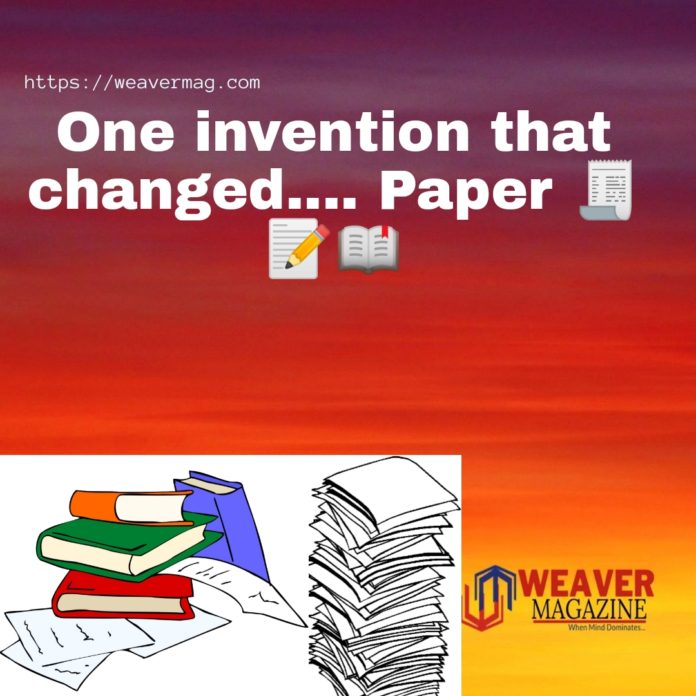One invention that changed the world–Paper…
Paper is a thin nonwoven material. Traditionally made from a combination of milled plant and textile fibers and commonly white in color. When we write down notes, make a sketch or a drawing, we all use an identical material called paper. It is a significant invention that changed the planet immensely.
History of paper
In 105 AD, in China, the paper was first invented by Ts’ai Lun, a Chinese inventor and a member of the first Chinese Imperial Court from Lei-yang in China. It eventually became an invention that benefitted a huge number of individuals.
The fibrous inner bark of the mulberry made up the early Chinese paper. To separate the fibers, the bark would be pounded in water. The soupy mixture is then poured onto a tray with a bottom of thin bamboo strips. On a smooth surface, the soft mat that remained would be laid to dry, after the water was dripped away. Grinding material into a pulp, forming it into thin sheets, and drying it in a form is the method that is normally used to make paper, nowadays.
Types of paper
There are many sorts of papers, each designed for a specific purpose and use, such as:
• Bond paper
A type of paper that is stronger and more durable than a typical sheet of paper. Low-quality pulp usually makes up the bond paper, which is usually rag pulp.
• Gloss coated paper
Flyers and brochures normally use gloss paper because it features a high shine, which attracts customers.
• Matt coated paper
Matt paper is coated with a muted finish to supply a paper that is not shiny. Matt coated paper is perfect for reports or leaflets. Formal events normally use matt coated paper like calling employees or shareholders to business meetings.
• Recycled paper
Reused paper products make up recycled paper. People trying to reduce their environmental impact and carbon footprint generally use recycled paper. Many documents, including reports or forms, use recycled paper
• Uncoated paper
Found in nearly all, if not all, most office printers, uncoated paper has no coating, making it excellent for ink absorbency. Both printers and pens use uncoated paper because it is uncoated, making it ideal for both forms and memo paper.
• Watermarked paper
The watermarked paper gives a feel of luxury and top quality, so watermarked paper makes up high-quality paper. Important documents, including exam certificates or sometimes legal documents, use watermarked paper.
The printing press
With every great invention, there was something else, which might make the invention better or easier to operate/manufacture. For the laptop, it had been the mouse. For the car, it had been the seatbelt. For paper, it was the press. Johannes Gutenberg invented the printing press in 1450. The invention of the press made it easier to in paper by mechanical means instead of by using handwritten ink, which might prevent human error and have better handwriting.
Before paper
There have been some ways of taking down notes or keeping a record of something, before paper, for example:
• Clay tablets: Ancient Mediterranean civilizations used clay tablets for classy accounting systems.
• Bamboo: Chinese scholars wrote on bamboo stalks as way back as 500 BCE. The scholars used small knives to scrape mistakes.
• Papyrus: The oldest discovered papyrus scrolls go back to 2500 BCE but papyrus cost a lot of money to create, so most people usually washed and reused papyrus.
After paper
It became easier to jot notes or make sketches after the creation of paper and this invention helped millions because it allowed communication and for people to find out new things. Published books increased the curiosity for people to understand more about the planet and it allowed others to write down important theories and concepts.
Conclusion
A company ponders whether they remembered to tell their clients about the meeting at 9:00 am. The village headman thinks whether he has visited the farm due to an invitation from the owners. The teacher tries to recollect whether if she has informed the headmaster that she is taking leave on Wednesday.
All these problems have one solution-paper.










